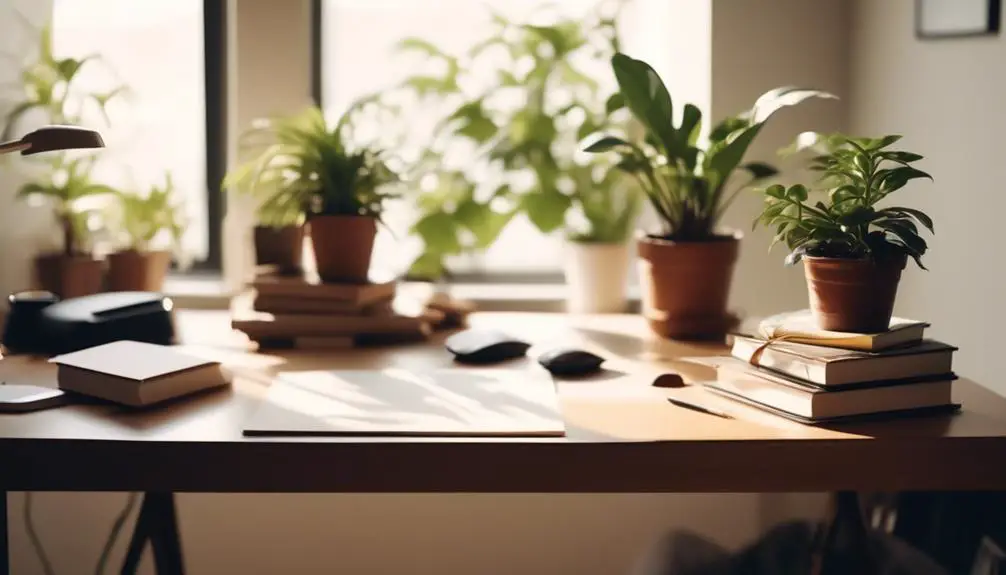In today’s fast-paced world, many people are overwhelmed by clutter in their physical, digital, and mental spaces. Whether it’s a messy desk, an overflowing inbox, or a busy schedule, clutter can negatively affect your ability to focus. The act of decluttering is often thought of as just tidying up, but its benefits go far beyond a neat and organized space. It can help improve your focus, reduce stress, and even boost your productivity.

Why Decluttering Is Important for Focus
Clutter is more than just an eyesore – it can have a profound impact on your ability to concentrate. Numerous studies have shown that a cluttered environment can contribute to feelings of stress and anxiety, making it difficult to stay focused on the task at hand. A study by the Princeton University Neuroscience Institute found that physical clutter in your surroundings competes for your attention, which can negatively impact your ability to process information (McMains & Kastner, 2011).
When your space is organized, you create a calm, clear environment that fosters concentration and mental clarity. By reducing distractions, decluttering helps you focus on what’s truly important.
1. Decluttering Helps Reduce Stress
A chaotic environment can trigger the body’s stress response, leading to feelings of anxiety and overwhelm. This is because clutter signals that there are unresolved tasks or things that need attention. When you’re surrounded by disorganization, it can feel like you’re constantly behind, which makes it hard to relax or focus.
On the other hand, a tidy environment promotes calmness. When everything has its place, there’s less mental friction, making it easier to focus on what matters. A clutter-free space allows you to feel more in control, which can significantly reduce stress levels.
Research has shown that the act of organizing and cleaning up can even lower cortisol levels, the hormone associated with stress (Saxbe, 2011). By maintaining a decluttered space, you are setting yourself up for a more peaceful, focused, and stress-free life.
2. Improved Mental Clarity and Focus
The mental load of clutter is not limited to physical objects. A cluttered home or workspace often represents mental clutter too. You may find that your brain is constantly distracted by things you need to do or tasks you’ve put off. This mental clutter can overwhelm your cognitive resources, making it difficult to focus on the present moment.
Decluttering your physical surroundings can lead to improved mental clarity. When you reduce distractions, your mind is less likely to wander, allowing you to focus on the task at hand. A study published in Personality and Social Psychology Bulletin found that people in more organized environments performed better on tasks requiring attention and focus (Vohs et al., 2013).
By clearing out unnecessary items, you’re essentially creating a mental “clean slate” that can help you focus better on your work or personal life.
3. Increased Productivity
Decluttering isn’t just about cleaning up your physical space; it’s also about simplifying your tasks and processes. When you eliminate excess, you reduce the time and energy spent on things that don’t serve you. Instead of sorting through piles of paperwork or sifting through countless digital files, you can direct your energy toward more meaningful activities.
A decluttered workspace allows you to prioritize tasks more effectively. When everything is organized, you can locate what you need quickly, which helps you move through tasks faster. With fewer distractions, you’re able to achieve more in less time, boosting your overall productivity.
In addition, a clean and organized environment can foster creativity. When you’re not distracted by disorganization, your mind is free to think more clearly, allowing you to come up with innovative ideas and solutions.
4. Decluttering Boosts Emotional Well-being
Decluttering has positive effects not only on your physical environment but also on your emotional well-being. People often hold on to items because they have emotional attachments to them, or because they believe they might need them in the future. However, the emotional baggage of keeping these items can create stress and clutter your mind.
By letting go of items that no longer serve you, you make space for new, positive energy in your life. The process of decluttering can be a therapeutic experience that helps you re-evaluate your priorities and reduce emotional attachment to things. A minimalist mindset can help you focus more on experiences and relationships rather than material possessions, which contributes to overall happiness.
Moreover, the act of letting go of items can be a form of self-care, as it allows you to focus on what truly brings you joy and value. This can have a profound effect on your mental and emotional health, helping you feel more centered and focused.
5. Decluttering Your Digital Life
In the digital age, clutter isn’t limited to physical spaces. Our digital lives can become just as overwhelming, with overflowing email inboxes, countless apps, and unorganized files. Digital clutter can be just as distracting as physical clutter, preventing you from focusing on more important tasks.
Taking the time to declutter your digital devices – whether it’s organizing your emails, deleting unused apps, or cleaning up your desktop – can greatly improve your productivity and focus. By organizing your digital life, you eliminate distractions and create a more streamlined workflow.
Furthermore, reducing digital distractions can help you avoid the temptation to check social media or dive into unnecessary browsing, which can disrupt your focus. By decluttering your digital environment, you’ll find it easier to stay on task and be more intentional with your time online.
Practical Steps to Declutter Your Life for Better Focus
- Start Small: Begin with one area at a time – your desk, your closet, or your email inbox. Starting small helps you avoid feeling overwhelmed and makes the process more manageable.
- Set Goals: Break down your decluttering tasks into smaller, achievable goals. For example, you could aim to declutter your workspace for 15 minutes a day until it’s organized.
- Let Go of Unnecessary Items: Assess each item and ask yourself if it serves a purpose. If it’s not necessary or meaningful, it’s time to let it go.
- Organize Your Digital Space: Declutter your devices by organizing your files, deleting unused apps, and unsubscribing from email lists that no longer bring value.
- Create a Maintenance Routine: Once you’ve decluttered, establish a routine to maintain order. Regularly tidy your space and digital devices to prevent clutter from piling up again.
Conclusion
Decluttering your life is not just about tidying up your space – it’s about creating an environment that promotes mental clarity, reduces stress, and enhances focus. By clearing out the physical, mental, and digital clutter in your life, you pave the way for increased productivity, better emotional well-being, and a greater sense of control. The benefits of decluttering extend far beyond having a clean space – it’s an investment in your mental and emotional health, allowing you to focus on what truly matters.
References
- McMains, S., & Kastner, S. (2011). Visual attention and cortical mechanisms of selective attention. Current Opinion in Neurobiology, 21(2), 183-190. Available at: https://www.sciencedirect.com (Accessed: 7 August 2025).
- Saxbe, D. (2011). The Role of the Physical Environment in Stress and Coping. Harvard University Press. Available at: https://www.hup.harvard.edu (Accessed: 7 August 2025).
- Vohs, K. D., et al. (2013). Physical order produces healthy choices, generosity, and conventionality, whereas disorder produces creativity. Personality and Social Psychology Bulletin, 39(12), 1514-1526. Available at: https://journals.sagepub.com (Accessed: 7 August 2025).









